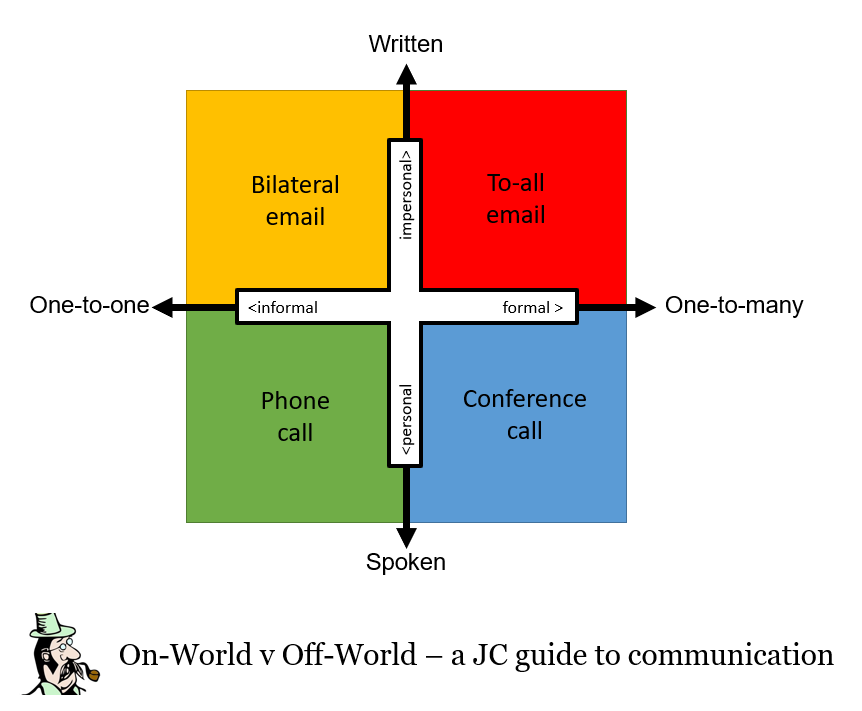Talk, don’t email
|
Negotiation Anatomy™
|
If process efficiency is your goal — if, like me, you’ve recently discovered the Toyota Production System and can’t stop thinking about it, if you are all about eliminating waste and waiting time, consider the difference between emailing the guy in credit with your question, and waiting 24 hours for him to pick it up, think about it, and send you an elliptical reply (as likely as not kicking off a circle of escalation) — it never quite answers the question you had first time, does it? — or calling the guy up and asking him there and then?
In the first case there is so much waiting: the time it takes to compose that email, setting out the issue clearly, the pros and cons and the desired outcome. Then the waiting. The wondering. The nervousness. The stress. The heart flutters, as you neurotically pick petals off the daisy. Has he read it? Will he soon? Does he even care? Should I maybe send a follow-up email? Will I seem needy?
(It will never occur to a negotiator to call. This may be because systematic juniorisation of the negotiation function means the negotiators do not have the experience and expertise to talk fluently on their subject matter, and are therefore afraid to call — and ironically their counterparts, similarly juniorised, will be afraid to pick up.)
External negotiation
The same will obtain, a 40 ri, with external negotiation common especially where counsel are involved.
Here there is the added fritzl of the agency problem thrown in for good measure. What are you to do when presented with a draught that apparently contains errors or diverges from the agreed transaction?
One of three things can have happened. One: you have misunderstood the transaction. Two: the other side’s counsel has misunderstood the transaction, or sent the wrong doc, or not checked it properly. Three: you both understood the transaction perfectly, but the other side is nefariously trying to retrade.
The overwhelming odds are that it is one of the first two. Even if it isn't, the best thing to do by far is to call. You will know soon enough if your counterparty is a rogue. In any case such a call Will quickly resolve any misconceptions common misunderstandings, and and identify that yes, indeed, there has been some costly mistake. That's, you have solved yourself, your counterparty, and your clients, hours of your time that you would otherwise patiently spend and marking up a clearly erroneous document.
Remember the maximum if the same circumstance can be explained by malice and stupidity, assume stupidity until you know better.
Intervene with ugly complex . For a paid advisor has little incentives to do the common sense and put in that call. She may be fearful of displaying her own ignorance bracket in scenario 1 if it turns out to be a 2, most likely no one will notice hencewith the dilemma of legal value and the dog didn't bark in the Night-Time.
Communication as an infinite game
The same dynamic exists in a negotiation. The JC snookered himself into using a four-box quadrant to illustrate this — he has an irrational fear of anything thought-leaders are fond of — but they do seem to fit here because there are two perpendicular axes at play: How many people are you speaking to, and in what medium.
How many
How many people are in your audience? The more there are, the more formal you must be, the more generalised, the less opportunity for there is for nuance and that lubricating milk of human frailty, wit. The more people, the narrower will be their common interest. Plainly, the more people there are, the greater will be the cultural, social and human barriers to unguarded constructive communication.
Fort any communication other than a one-way broadcast, one-to-many is a categorically worse medium for communication than one-to-one.
What medium
Now your “medium of communication” can take a more or less personal, and immediate form. The least personal and immediate communications are written ones (here the message is, literally, removed from the sender’s personality and, even where transmitted immediately, need not be answered in real time). The most personal and immediate ones are in actual, analogue person — like that ever happens these days — and failing that, a video call where you can see and hear nuance, then an audio call where you can just hear it. But any of these is vastly superior to written communication.
On constructive and defensive communication
In terms of our Onworld/Offworld distinction let us make some value judgments: whether we like it or not, the offworld we inhabit is a complex, non-linear one. Personal, creative, immediate, and substantive communications beat impersonal, delayed, and formalistic ones. Constructive communicators — players of “keepy-uppy” and like-minded infinite games — communicate to get along, and they therefore get on better than those who communicate defensively — who play backward-looking, bounded, aero-sum, finite games.
But the sorts of communications you favour depend what sort of, and how good, a communicator you are. Constructive, expert, imaginative, pragmatic, empathetic participants will be good at immediate interpersonal communications. Negative, defensive, inexpert, heartless, wooden communicators tend to be better at delayed, written communications.
Why would you design your communication channels to favour negative, unempathetic, inexpert, defensive people?
If you just call her, you get the warmth of human contact right off the bat, you get to lay out the issue directly without all that formatting and colour coding, and if you really need to you can (and okay, probably should) send him an email afterwards memorialising what you discussed — this can be shorter, since you don’t need to lay out all the explanatory detail, and no need for colour-coding — and also you are not waiting on anything from this email: you have the oral decision, you can go — the credit dude can confirm in due course.
